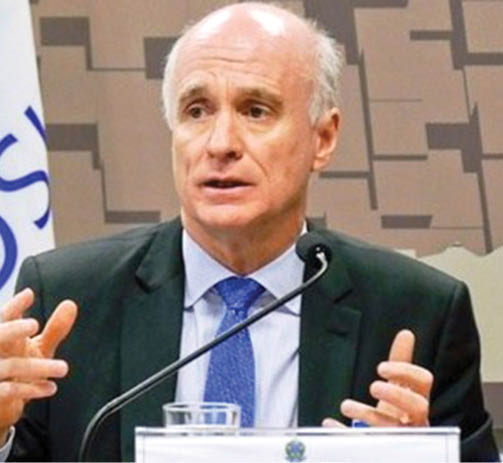Nigeria-Brazil agric project: Bank to dispatch 120m Euros soon
On Thursday, the Vice President, Yemi Osinbajo, launched the Nigeria-Brazil Bilateral Development Programme: “The Green Imperative”, designed to mechanise the nation’s agriculture. Daily Trust on SunSunday caught up with the Brazilian Ambassador to Nigeria, Mr. Ricardo Guerra de Araujo, at the event. Why do you think The Green Imperative will change the fortunes of […]

On Thursday, the Vice President, Yemi Osinbajo, launched the Nigeria-Brazil Bilateral Development Programme: “The Green Imperative”, designed to mechanise the nation’s agriculture.
Daily Trust on SunSunday caught up with the Brazilian Ambassador to Nigeria, Mr. Ricardo Guerra de Araujo, at the event.
Why do you think The Green Imperative will change the fortunes of Nigeria’s agriculture?
The Green Imperative is, in fact, the biggest bilateral project in the African continent, with $1.1 billion, after so many months of hard work and countless meetings held in Abuja, Brazil and elsewhere.
Why The Green Imperative? It is because there is no other alternative than to diversify the Nigerian economy by investing in the agricultural sector in order to reduce over-dependence on the unstable oil revenues and ensure food security and food autonomy.
Brazil, with its efficient, dynamic and vibrant agribusiness and financial sector is more than willing to help Nigeria to accomplish this challenge.
The Nigeria-Brazil Bilateral Development Programme covers all aspects of agricultural value chain – from production, distribution, storage, access to loan, inputs and machinery, including, of course, the training of young people. We estimate that we can train around 100,000 young Nigerians under the N-Power agro programme.
Brazilian companies will export parts of 10,000 tractors and 50,000 machines. The fundamental difference in this deal is that these tractors, machines, and equipment will be assembled here in the Nigerian territory in 20 states of the federation, and more than 700 service centres will also be created to assist the smallholder farmers to prepare their soil from planting to harvesting. This transfer of technology will help in technical capacity building in the country which will help the Nigerian economy. The initiative will contribute to creating an estimated five million new jobs; reduce the rate of poverty and unemployment across the agricultural value chain, especially among the youths.
Now that the project has been officially launched today, when do we expect it to take off?
As far as I know, the first financing part will be available very soon, say in the next two months. It will be something around 120 to 130 million Euros that will be made available by the Brazilian Deutsche Bank. And that will be made available three or four times, but the idea is to make the first part available very soon so that the Nigerian Government can start to buy parts and finally assemble these tractors, machines, and equipment in Nigeria. The idea is to create jobs here in the country and not to export the final products. This is a long time project that will take some years because we have to train, we have to develop capacity building in Nigeria, we have to qualify young Nigerians to work in the factories, farms, and make farming attractive to young Nigerians.
Apart from agric equipment, what other collaboration is your government willing to work with the Nigerian Government on?
Beside this bilateral project, there is also a huge cattle rearing opportunity in Nigeria. Brazil is the number one meat exporting country in the world. So Brazil probably has a lot to share with Nigeria in cattle rearing. I know that ranching here is an important issue because of the conflict between farmers and cattle rearers. So this is an area Brazil could share its own experience with Nigeria: ranching policy and technology. We developed these in the last 50 years in Brazil. We know how to do it.
